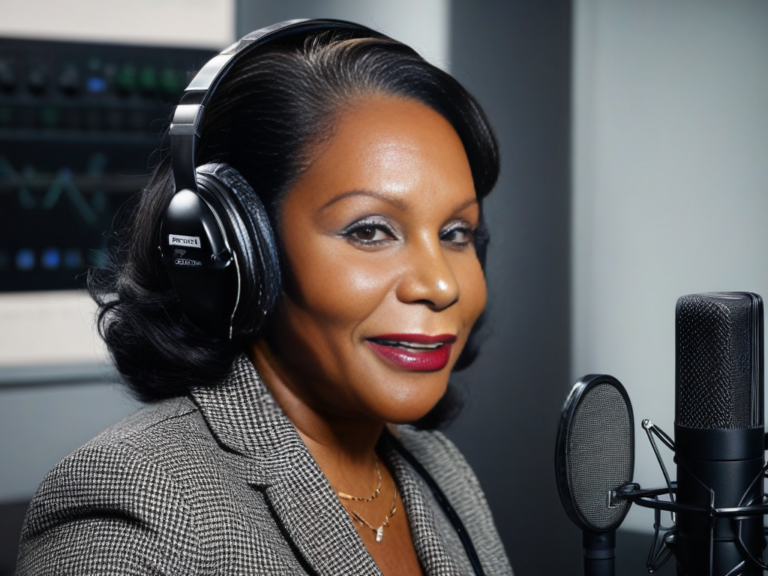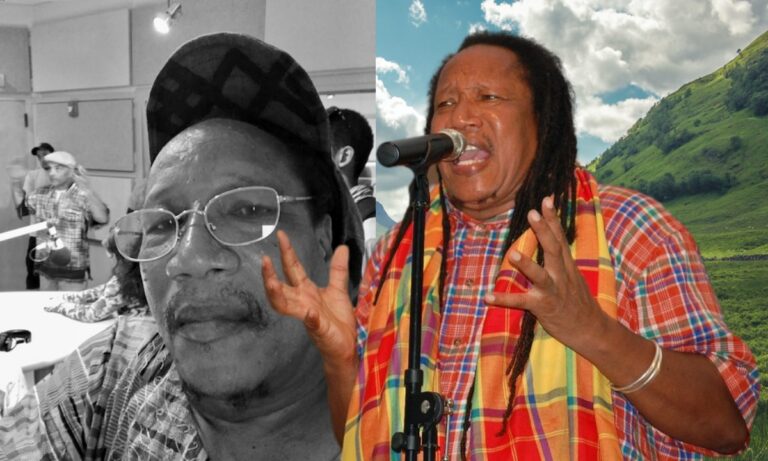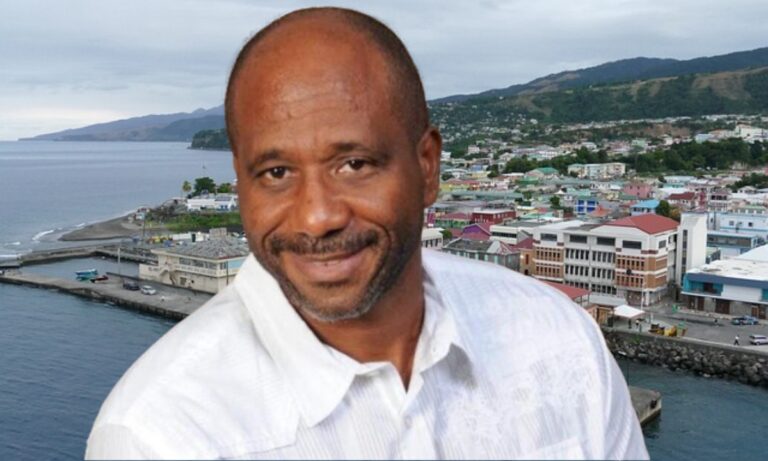 His daughter left the sad news on his FaceBook account: I’m Jacqueline Pearson, daughter of Raglan Riviere and sister to Emile Riviere, informing you of our Dad’s passing away peacefully in his sleep in the early morning hours of July 6, 2015. We will post funeral details at a later date. Thank you for your love, support and prayers.
His daughter left the sad news on his FaceBook account: I’m Jacqueline Pearson, daughter of Raglan Riviere and sister to Emile Riviere, informing you of our Dad’s passing away peacefully in his sleep in the early morning hours of July 6, 2015. We will post funeral details at a later date. Thank you for your love, support and prayers.
Dominican-born, educated at the Dominica Grammar School, studied in the UK, and had a tour of duty in the British Royal Air Force, Raglan holds a B.Sc. (Sociology, London U) and MHA (Health Administration, Ottawa U). Raglan has always been fascinated by the structures and processes which give life to society.
Raglan Riviere
Raglan Riviere profiles – Canada | LinkedIn
- Title: Author and Independent Internet Professional
Tribute:
In 1999, I came across the website “Sir Raglan Presents.” It was an internet portal designed
by Dominican-born civic leader Raglan Riviere, then a resident of Canada. From what I could discern, his
website was focused on spotlighting the achievements of Dominicans and those of Dominican heritage, at home and abroad. For instance, if a child of Dominican parents graduated from university with honours, his website would pay tribute to such academic excellence and spread the good word.
Raglan’s website also featured information on our current affairs, history, culture and Pan-Africanism.
As a young nation, such promotion of good values in education, or recognition of our heritage, is the
veritable glue which binds a group of people into that body we call “a nation.” Impressed by Raglan’s
work, and considering the need for an online entity to bind Dominicans together in meaningful development endeavours, I contacted Raglan on or about August 1, 2000. I suggested we form a Dominica Academy of Arts and Sciences (DAAS). DAAS would unite Dominicans at home and abroad into a skills directory online and partner with the government and private sector to promote development in Dominica. Raglan, a former Dominica Grammar School cadet, Royal Air Force veteran, hospital administrator and author, needed no prodding, and he agreed. The DAAS was born on November 1, 2000.
The DAAS was incorporated in the US, and Dominica and Dr. Clayton Shillingford became its first President
in December 2000. The online Academy was formally launched at the Dominica Diaspora in the Development Process Symposium held on December 7, 2001, in Brooklyn, New York, which the Roosevelt Douglas Foundation organized.
At the 2002 Dominica Diaspora in Development Symposium held in Roseau, Dominica, Dominica President Vernon Shaw presented Raglan Riviere with the RDF Medal of Honor for his work; in Raglan’s absence that
the award was received on his behalf by his brother Hon. Osborne Riviere, then Trade Minister in the Dominica Government.








A tribute to Raglan Riviere
By Gabriel Christian Esq
July 18, 2015 5:45 P.M
Toronto, Canada (TDN) On July 6, 2015, Raglan Riviere, the co-founder of the Dominica Academy of Arts & Sciences (the “Dominica Academy” hereinafter) passed away. A soft spoken and modest person, Mr. Riviere quietly toiled away at his computer to fashion the Dominica Academy’s website http://www.da-academy.org as a platform atop which Dominicans at home and abroad could gather to pursue development projects in the arts and sciences.
In fifteen years of endeavor since its launch on November 1, 2000, the Academy accomplished many things, big and small, to include: assisting youth development in supporting the revival of the Dominica Cadet Corps, providing medical supplies to restocked the medical stores when the facility at the Princess Margaret Hospital was consumed by fire in 2005; hosting the Dominica Development symposiums alongside the Roosevelt “Rosie” Douglas Foundation and encouraging research and development in agriculture, arts, history.
The first ever soccer competitions on island between the residents and those born overseas of Dominican heritage took place in 2005 as part of this inspired coming together of the Dominican family, as is chronicled here – http://www.da-academy.org/daaschronicle03.html . Of great importance to our survival however, was the effort he led to create the Dominica Botanic Gardens website launched in 2005.
The Botanic Gardens – A Development Laboratory
In the widely acclaimed book Science and Colonial Expansion by Lucille Brockway (Yale University Press, 2002) the role of economic botany is explored in how it made Great Britain the most powerful nation on earth in the 19th century. Britain, unlike any power before – or since – had created a network of botanic gardens and a systematic research infrastructure to determine which plants grew best, where, and how.
With the Royal Botanic Gardens at Kew as the mothership, satellite botanic gardens were developed across the empire in pursuit of finding those plants which had value for human sustenance. The Dominica Botanic Gardens, started in 1890, and was one of those satellite stations developed by Kew Gardens. Charles Murray of the Edinburgh Botanic Gardens was its first curator.
In the middle of the 20th Century the Dominica Botanic Gardens was considered one of the most beautiful botanic gardens in the world. The book clearly reveals that Britain’s success did not derive solely from superiority in the military arts, but also thrived on the basis of superior organization, and teamwork which birthed a competence in the botanic sciences.
For instance, the development of West Indian sugar cane cultivation provided the capital which propelled Britain’s industrial revolution; rubber grown in Asia spurred innovation in transportation, and sisal was grown to make rope – a basic but essential tool for modernity.
Most telling in this focus on using the scientific method was the role of the cinchona plant in making quinine so as to combat malaria disease so prevalent in lands the British sought to colonize. In 1860 a British expedition to South America led by Clement Markham brought back smuggled seeds and plants which were introduced in several areas of the British ruled India and Sri Lanka. So able to combat malaria, British settlers could now pursue their commercial interest with slight hindrance from that disease.
The breadfruit is common place on Dominica and other parts of the West Indies and is a potential ally in our quest for food security. However, how many people know that this fruit came from the 1793 expedition to Tahiti and the other islands in the south Pacific by Royal Navy Captain Bligh? Bligh’s expedition had been backed by Sir Joseph Banks, patron of Kew Gardens. An earlier mission had led to the mutiny of Captain Bligh’s crew.
The mutineers under one Fletcher Christian had cast Bligh adrift in the hope he would perish. Bligh, a skillful navigator, survived and he finally brought the breadfruit to the West Indies as a source of food for the enslaved Africans who worked the land growing sugar cane.
Today, however, our people have cast off the chains of slavery. But what about the chains on our minds which inhibit reasoned judgment, knowledge of our past as a guide to the future, collaborative engagement in the arts and sciences, or beneficial partnerships in enterprise across the political divide?
Why is it that our Dominica Botanic Gardens is not at the center of our quest for survival, as it should be? If we do not protect, preserve, and promote our Dominica Botanic Gardens how can we meaningfully advance our agriculture?
The Dominica Academy was a grassroots effort, founded by us, for us. It was designed as a space within which we could enjoy the freedom to engage critical and scientific inquiry so as to innovate and create that which is needed to build a competent and advanced society. It was designed to be non-partisan and focused on the development mission.
Dominicans at home, and abroad, could combine our efforts in beneficial development endeavor – just as other great nations have done. Those who miss that point have failed to grasp the importance of such an academy, or the importance of transforming beneficial colonial era institutions to sustain a more independent future.
In the face of such challenges, what will it take for Dominicans at home and abroad to appreciate that we have the key to mastery in agriculture in the center of our national capital? That key is The Dominica Botanic Gardens. How many school tours take place there? How many symposia on plant science and food security take place there?
What displays on local, lean and green cuisine can we host under the auspices of our gardens to cultivate a love for agriculture among our young? Where in national planning, or legislation, do we see an effort for the expansion of research and development based on our Dominica Botanic Gardens?
Where is the consensus that we should develop the Dominica Botanic Gardens as a world class center of learning in the botanic sciences? During the annual independence celebrations a big fete is held at the Dominica Botanic Gardens, the so-called “Creole in the Park.” That event has absolutely no focus on the botanic sciences. Such misplaced energy is a rebuke to common sense. We can celebrate, yet educate. We must learn to place education ahead of entertainment, it is that simple.
Proposals to Preserve & Promote the Dominica Botanic Gardens To that end we propose: • A Dominica Botanic Gardens Society – by legislation
• A Dominica Botanic Gardens Day
• A National Herbarium
• A Dominica Botanic Gardens & Food Science Education Series
• A Dominica Botanic Gardens Conference to Devise Ways/Means to Preserve and Promote the Gardens; Encourage Research and Development in the Botanic Sciences and Enhance Agricultural Science Education on Dominica.
Where we implement such recommendations, in partnership with institutions such as the Smithsonian and eminent botanist Dr. John Kress, we shall make progress. In 2010 the Dominica Academy started the process of collaboration with the Smithsonian by sending Dominica State College students for summer study programs at the Smithsonian Institution in Washington, DC.
There is national consensus that, for some time now, Dominica’s economy has groaned under the weight of an unsustainable food import bill. In the same week Mr. Riviere passed, Dominica born Pan American Health Organization Director Dr. Carissa Etienne lamented that the island’s population is increasingly obese and diseased by too much “fast-food” consumption.
We must focus on making our own food and ensuring the best in food quality. Therefore a focus on botanic sciences in ensuring healthy foods for our population is of critical importance. In 2000 we made a start when we formed the Dominica Academy; other willing hands must now assemble to take the helm and so guide the development process.
Raglan Riviere gave his last full measure to such an effort to develop our capacity in the arts & sciences. Not only was he an author, but he understood the importance of the sciences, and the importance of chronicling our march through time as a guide.
Based on the teaming concept of the Dominica Academy he worked tirelessly as the webmaster to develop the Dominica Botanic Gardens website. Mr. Riviere was ably assisted by Dr. Clayton Shillingford, Dr. Davidson Shillingford.
The website was buttressed by the photographs and work done by Botanic Gardens staffers, plus Arlington James, Major Francis Richards and many other contributors – some of whom provided historic prints from their archives.
The work of Raglan Riviere, and those who stood with him, was grounded in a patriotic commitment to national development, and was born of sincere volunteerism. Raglan’s work on the website spanned many areas as exemplified on the site map,www.da-academy.org/daas_sitemap.html that deals with adult education, Diaspora relations, economic development, health services, and an array of hosted websites on Dominica’s indigenous people, island scholars, Academy honorees and selected biographies of Dominica’s leaders in politics, arts, religion and business.
That team effort led by the Dominica Academy birthed what is – arguably – the best botanic gardens online site of its kind in the former British West Indies. However, we are not satisfied. We can do even better where we work as a team; divided we cannot long endure.
But, as the British did before us, we must wisely take ownership of those beneficial systems they created– such as the Dominica Botanic Gardens – and enhance them so that our nation can survive and thrive. Such unity of purpose in the arts and sciences, as exemplified in the majestic work on the Dominica Botanic Gardens website of the Dominica Academy would be a wonderful tribute to a son of the soil who gave his best. Let us therefore remember him and the good for which he stood.